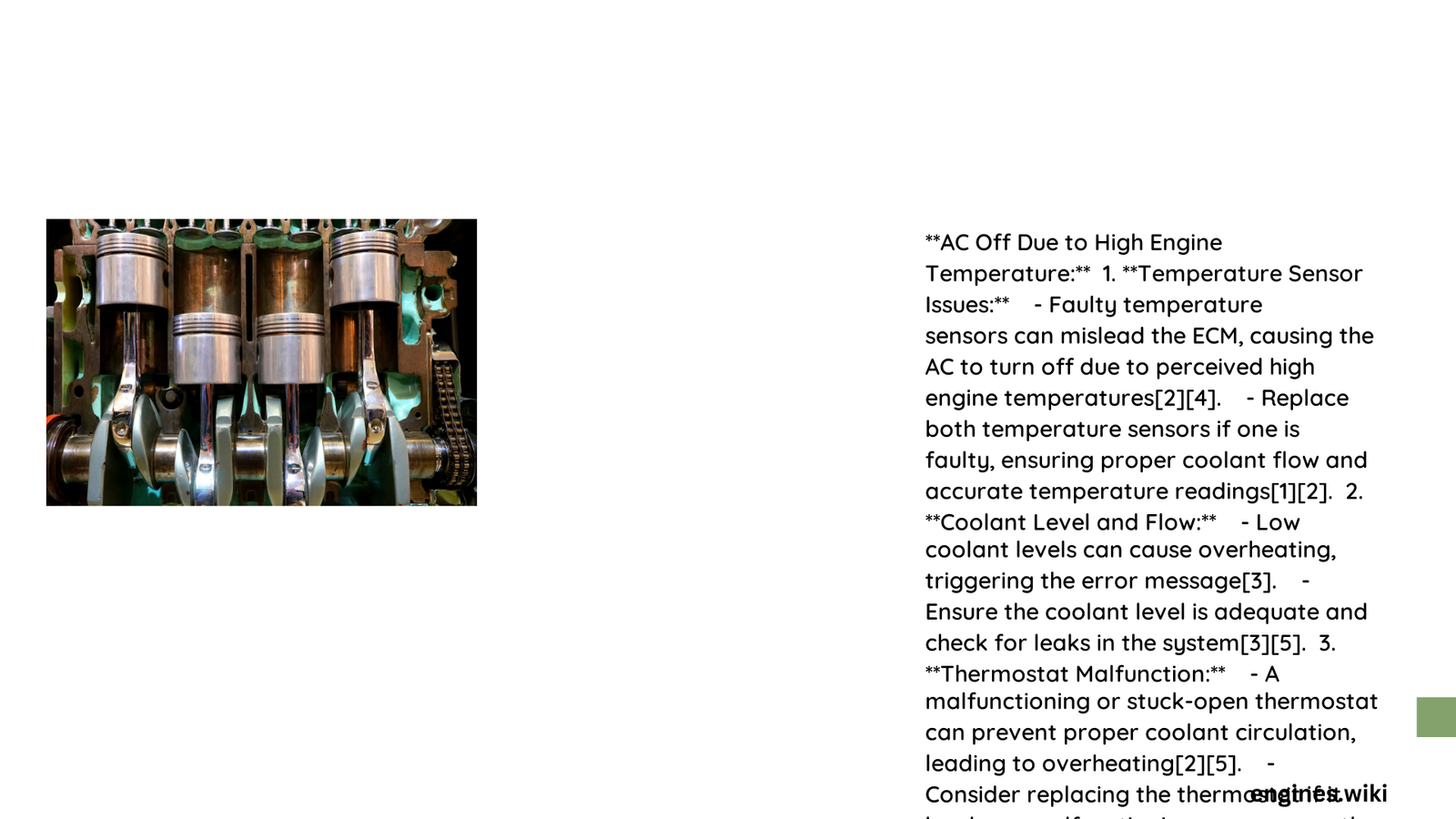When your vehicle’s air conditioning suddenly shuts off and displays a warning about high engine temperature, it signals a critical cooling system problem that demands immediate attention. This protective mechanism prevents potential engine damage by disabling the AC compressor when internal temperatures exceed safe operational thresholds, indicating underlying issues with coolant circulation, sensor malfunction, or cooling system components.
What Triggers AC Shutdown During High Engine Temperature?
Modern vehicles are equipped with sophisticated temperature monitoring systems that protect critical engine components. When engine temperature rises beyond acceptable limits, the vehicle’s Engine Control Unit (ECU) initiates protective protocols to prevent potential mechanical damage.
Key Temperature Thresholds
| Temperature Range | System Response | Potential Risk |
|---|---|---|
| 195-210°F | Normal Operation | No Risk |
| 210-220°F | AC Compressor Disabled | Moderate Risk |
| 220-240°F | Critical Overheating | High Mechanical Damage Risk |
Why Does AC Turn Off During High Engine Temperature?

The AC system’s shutdown is a deliberate safety mechanism designed to:
- Reduce additional heat generation
- Prevent compressor damage
- Minimize engine stress
- Protect critical mechanical components
Common Causes of High Engine Temperature
- Coolant System Issues
- Low coolant levels
- Coolant leaks
- Blocked radiator
- Faulty water pump
-
Damaged radiator hoses
-
Sensor Malfunctions
- Defective temperature sensors
- Electrical connector problems
-
Incorrect sensor readings
-
Mechanical Failures
- Thermostat dysfunction
- Cooling fan failure
- Compromised radiator performance
How to Diagnose AC Off Due High Engine Temperature?
Diagnostic Steps
- Check coolant levels and condition
- Inspect radiator and cooling fans
- Test temperature sensors
- Scan for diagnostic trouble codes
- Examine electrical connections
- Verify thermostat functionality
What Are Potential Repair Costs?
Repair expenses can vary significantly based on the specific issue:
- Coolant temperature sensor replacement: $50-$200
- Radiator repair/replacement: $300-$1,000
- Cooling fan assembly: $200-$600
- Thermostat replacement: $100-$300
Prevention and Maintenance Tips
- Regular coolant system inspections
- Maintain proper coolant levels
- Use manufacturer-recommended coolant
- Replace coolant at recommended intervals
- Address warning signs promptly
When to Seek Professional Help?
Consult a certified mechanic if you experience:
– Persistent temperature warnings
– Coolant leaks
– Unusual engine temperature fluctuations
– Repeated AC system shutdowns
Pro Tip: Never ignore persistent high-temperature warnings, as they can lead to catastrophic engine damage.
Technical Insights
The AC compressor requires significant energy to operate. During high engine temperatures, the ECU prioritizes engine protection by disconnecting the compressor, reducing overall system load and preventing potential thermal runaway.
Conclusion
Understanding the “AC off due high engine temperature” warning empowers vehicle owners to take proactive maintenance steps. Timely diagnosis and intervention can prevent costly repairs and extend your vehicle’s operational lifespan.
